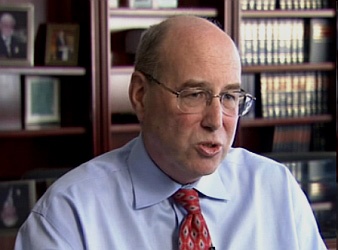Art Pope back in glare of national spotlight

NOTE: Posting will be light this week as the Institute for Southern Studies moves to its new offices at MDC in downtown Durham. We'll resume regular daily posting next week.
Art Pope, North Carolina's Republican mega-donor, is back in the national media spotlight.
Pope and his influential political machine first got national attention in 2010. That was the year that Pope, who for years had poured millions into funding conservative causes and backing GOP candidates, added a third piece to his state political empire: outside spending groups.
As Facing South reported, three Pope-backed organizations accounted for 75 percent of the outside money that flooded into North Carolina's legislative races, helping propel Republicans to a historic takeover of the General Assembly.
Investigations by Facing South and the Independent Weekly led to national attention by The New Yorker and MSNBC, and then Pope soon faded from the headlines. But now, after being appointed the most powerful position in N.C. Gov. Pat McCrory's cabinet -- director of budget policy -- Pope is again the target of national scrutiny.
In April, The Huffington Post drew attention to the budget Pope and McCrory proposed for 2013. The budget wasn't as draconian as many progressives feared, but there was one program Pope sought to eliminate completely: North Carolina's landmark system of "clean elections" to keep courts independent of special interest money.
Since 2004, the N.C. Public Campaign Fund has been used by 80 percent of the state's qualifying judicial candidates, who agree to raise money from 350 small donors in exchange for a public grant to run their campaign. By leveling the playing field, the program has increased the number of African-American and women judges serving on N.C. courts. With Republican support, West Virginia just passed a similar program -- using North Carolina as a model.
Pope and his network have fought these programs from the very beginning. The Pope-backed John Locke Foundation made elimination of public financing one of its top priorities for the GOP legislature in 2011. The Civitas Institute, also largely backed by Pope, labeled it "welfare for politicians" (although its sister group Civitas Action supported a candidate -- conservative N.C. Supreme Court candidate Paul Newby -- who used the program for his own campaign).
Also in April, MSNBC's Melissa Harris-Perry show also highlighted the role of Pope's network in pushing an array of measures that would restrict voting access, including a strict voter photo ID bill and measures to cut early voting days, eliminate same-day registration during early voting and eliminate Sunday "souls to the polls" voting.
A story in Politico this week also looks at Pope's ties to the debate over North Carolina tax policy. Americans for Prosperity, which Pope funds, announced it's spending $500,000 in N.C. to push for slashing state corporate and income taxes. The group's national president, Tim Phillips, told state lawmakers that if they go along, Americans for Prosperity will "have your back."
It's not an idle promise: In 2010, Americans for Prosperity spent nearly $285,000 on 19 state legislative races to benefit Republicans. In 2012, that number grew to nearly $470,000 -- including $225,000 targeting Paul Newby's supreme court race, and $130,000 in spending that benefited Gov. McCrory.
As the Center for Media and Democracy's PR Watch pointed out in April, the tax plan pushed by Pope's Civitas Institute echoes a radical plan also advance by the American Legislative Exchange Council: abolishing income and corporate taxes and replacing them with a sales tax. Civitas even brought ALEC author Arthur Laffer for a "briefing" to peddle his tax plan, which is widely criticized for being regressive.
Pope's groups also agree in pushing an end to the state's estate tax -- a tax that, because it only affects those with estates of $5.25 million or more, only affected some two dozen N.C. taxpayers in 2012. The estimated lost revenue for North Carolina: $52 million.
As usual, Pope has tried to downplay his influence in N.C. politics. As Politico reports, Pope told a group of students at the University of North Carolina that “I’m not the biggest political donor in North Carolina. The biggest political donors are Democrats."
The claim is deceptive: While there are generous individual donors that have given to both Democratic and Republican candidates and committees each election cycle on par with Pope, when one counts the money spent on advocacy groups and outside electioneering organizations, Pope's network reigns supreme. Over the last decade, Pope has pumped well over $40 million into those three pieces -- advocacy, campaign contributions and outside election spending -- of his machine.
Put together, that makes Pope by far the single biggest spender vying to influence North Carolina politics. And Pope's money and agenda will continue to generate controversy for Pope and the McCrory administration for months to come.
Tags
Chris Kromm
Chris Kromm is executive director of the Institute for Southern Studies and publisher of the Institute's online magazine, Facing South.
